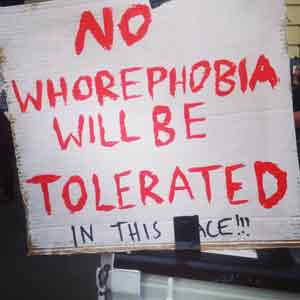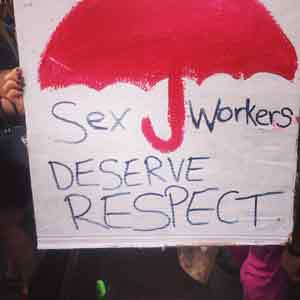
On Saturday October 18th Reclaim the Night once more took over the streets of Brunswick,
Reclaim the Night has not always been a safe space for sex workers – sex workers and their workplaces have been targeted by marchers previously (strip clubs have been protested both here in Melbourne and overseas).
But in recent years there has been a concerted effort by organisers to make Reclaim the Night an inclusive space, for both sex workers and trans* people, as emphasized here by organizer Natalie Pestana in an interview with City Journal –
Reclaim the Night: stop blaming the victim
Gathering with sex workers just prior to the event we found it off-putting to see Kathleen Maltzahn among the crowd, local candidate for The Greens and well known for her anti sex work views. However, organizers had just taped up a sign stating:
“NO WHOREPHOBIA WILL BE TOLERATED IN THIS PLACE!!!”
to the truck from which the speeches were being made. We felt reasonably confident our speaker, MJ and other sex workers present would be okay (to put this in context last year I spoke and was heckled).
MJ’s speech (see below) and the other speeches were great and well received.
Then we marched. The march is a difficult time for me – I don’t like crowds and the police are unsettling. The police don’t mean safety to many in sex worker community. In Victoria the police are the arm of the state that regulates sex industry workplaces, to many workers (particularly those whose work is criminalized, including street sex workers) their presence means harassment and violence. So marching along with police lining the route wasn’t comforting.
About halfway along a mobile billboard for one of the local strip clubs drove by on the other side. A group of men next to me started yelling abuse. I went up to them and explained that shouting abuse about women’s workplaces or the women who worked in them wasn’t okay (& also not in keeping with the idea of the event). They tried to argue with me, obviously upset that I had seen fit to interrupt their god given right to hurl abuse. I didn’t notice anyone else joining in but apparently it also happened earlier in the march.
Why is it that it’s so hard to get the message across in these settings that whorephobia is not okay?
With many feminist spaces having histories of exclusion and abuse towards sex workers and trans* people, it is necessary moving forward to have inclusive spaces, there must be clear policies of zero tolerance towards whorephobia and transphobia, but it is also critical to listen to those with lived experience – I invite you to do so now:
________________________________________
My name is MJ, I am a Victorian sex worker.
Sex work is often portrayed as violent; sex workers as victims, exploited, or otherwise coerced, but I am none of those things. I am immensely proud not only of my occupation, but of the strength, resilience and willingness to stand up against stigma that sex workers display globally.
Victorian Sex workers do not operate in the same night as the rest of you, as my fellow worker Jane Green told us last year.
In the state of Victoria we have forced STI testing – despite STI rates being lower for sex workers and condom use being well above that of the non sex working population.
We have special police units set up for us, to control and surveil our industry, our workplaces and our lives but who do not take violence against us seriously. Indeed, many sex workers in Victoria and other parts of the country report that the biggest perpetrators of violence are indeed the police. This is particularly so for migrant sex workers, who have often come from other countries with the express purpose of entering the sex industry. And also for those who are working in highly criminalized areas of the industry, such as street sex work.
Police harassment remains a key barrier to our safety and security.
It is extremely difficult to negotiate safety when police avoidance must be your key priority. In fact, many sex workers never come forward with experiences of violence, because they fear being victim blamed, shamed, being told that they some how invited the violence because of their occupation, or the fear of having their private experiences of violence made public.
Let me make this clear. Violence against sex workers happens not just because of individuals who choose to perpetrate violence, but because the laws governing sex work, and the way sex workers are viewed in our society ALLOWS IT TO.
Unfortunately violence towards sex workers can continue after a sex worker has died.
Just recently Brisbane sex worker Mayang Prasetyo was murdered by her partner. The Murdoch media, particularly the Courier Mail, and other various news outlets seized upon Mayang’s profession, and her identity as a trans woman. Mayang is one of an increasing number of women who are murdered by their intimate partners in this country, but this was overshadowed by the media’s desire to dehumanize Mayang and sensationalize her death by drawing on her gender identity and occupation.
Be under no illusion that this too is an act of violence.
To quote from an article in the guardian by local writer Amy Gray “it was not Mayang’s gender identity or occupation that killed her, but a man who felt entitled to murder her”.
Just as with Tracy Connelly before her, whose death was also heavily sensationalized, Sex workers should never be used as fodder for salacious headlines.
We are human beings who in life and death demand dignity, respect, and human rights.
Whether oppression comes from individuals, the media, the medical and legal professions, or certain elements of the artistic communities. It is oppression that sex workers demand an end to. It is oppression that non sex workers can support us in ending, by listening to our voices, and by walking beside us as allies on our journeys.
Only then will we walk in the same night as you do.
________________________________________

Visit Reclaim the Night’s website – Reclaim the Night
Reclaim the Night Melbourne Facebook – RTN Melbourne
Reclaim the Night Melbourne Twitter – @RTNmelb